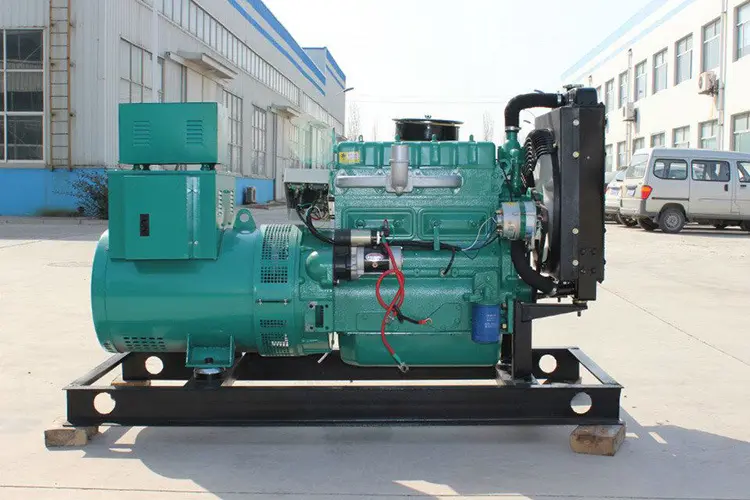Diesel Generators for Base Load Power A Comprehensive Guide

Introduction
Diesel generators have long been a reliable source of power for various applications, including providing base load power. In this article, we will explore the role of diesel generators in supplying base load power, their advantages and disadvantages, key considerations for selecting and operating them effectively, as well as the future outlook for diesel generators in the context of base load power generation.
Understanding Base Load Power
Base load power refers to the minimum amount of electrical power needed to meet the continuous, around-the-clock demand for electricity in a given region or facility. This demand typically remains relatively constant throughout the day and is the foundation of the electricity grid's operation. Base load power sources are required to operate continuously to meet this demand, providing a reliable and stable supply of electricity.
Diesel Generators for Base Load Power
Diesel generators are well-suited for providing base load power due to their robust construction, high efficiency, and fuel flexibility. These generators are capable of running continuously for extended periods, making them suitable for meeting the consistent demand for electricity in base load applications. Diesel generators come in various sizes and configurations, allowing for scalability to meet different power requirements.
Advantages of Diesel Generators for Base Load Power
1. Reliability: Diesel generators are renowned for their reliability and durability, making them ideal for base load power applications where continuous operation is essential.
2. Fuel Efficiency: Diesel generators are known for their high fuel efficiency, providing cost-effective power generation over the long term.
3. Quick Start- Diesel Generator For Sale : Diesel generators can be quickly started and ramped up to full capacity, making them suitable for responding to sudden changes in power demand.
4. Fuel Flexibility: Diesel generators can run on a variety of fuels, including diesel, biodiesel, and even alternative fuels, offering flexibility in fuel selection based on availability and cost.
5. Low Maintenance Requirements: Diesel generators have relatively low maintenance requirements compared to other power generation technologies, reducing downtime and operational costs.
6. Long Lifespan: With proper maintenance and care, diesel generators can have a long operational lifespan, providing reliable base load power for many years.
Disadvantages of Diesel Generators for Base Load Power
1. Environmental Impact: Diesel generators emit pollutants such as nitrogen oxides (NOx) and particulate matter, contributing to air pollution and potential health hazards.
2. Noise Levels: Diesel generators can be noisy during operation, which may be a concern in residential or noise-sensitive areas.
3. Fuel Storage and Handling: Diesel fuel requires proper storage and handling procedures to ensure safety and compliance with regulations, adding complexity to operations.
4. Carbon Emissions: Diesel generators produce carbon dioxide (CO2) emissions, contributing to greenhouse gas emissions and climate change.
5. Initial Cost: The upfront cost of purchasing and installing diesel generators can be higher compared to some other power generation technologies, although this cost may be offset by the generators' long-term reliability and efficiency.
Considerations for Selecting and Operating Diesel Generators for Base Load Power
1. Power Requirements: Determine the specific power requirements of the base load application to size the diesel generator appropriately.
2. Fuel Selection: Evaluate the availability and cost of different fuel options to select the most suitable fuel for the diesel generator.
3. Maintenance Planning: Develop a comprehensive maintenance plan to ensure the diesel generator operates efficiently and reliably over its lifespan.

4. Emission Control: Implement emission control measures, such as exhaust gas treatment systems, to minimize the environmental impact of diesel generator operation.
5. Noise Mitigation: Consider noise mitigation measures, such as soundproof enclosures or barriers, to reduce the noise levels generated by diesel generators.
6. Compliance with Regulations: Ensure compliance with local, state, and federal regulations regarding emissions, noise levels, fuel storage, and other aspects of diesel generator operation.
Future Outlook for Diesel Generators in Base Load Power Generation
Despite the increasing focus on renewable energy sources such as solar and wind power, diesel generators are expected to continue playing a significant role in base load power generation for the foreseeable future. The reliability, flexibility, and efficiency of diesel generators make them a viable choice for meeting the continuous demand for electricity in various applications, including industrial facilities, data centers, hospitals, and remote off-grid locations.
However, advancements in diesel engine technology, such as improved fuel efficiency, emission control systems, and integration with energy storage solutions, are driving innovation in the diesel generator industry. These developments aim to enhance the performance and environmental sustainability of diesel generators, ensuring their continued relevance in base load power generation while addressing concerns related to emissions and fuel consumption.
Conclusion
Diesel generators are a reliable and efficient option for providing base load power, meeting the continuous demand for electricity in various applications. While they have advantages such as reliability, fuel efficiency, and quick start-up, diesel generators also present challenges related to environmental impact, noise levels, and fuel handling. By carefully considering key factors such as power requirements, fuel selection, maintenance planning, and compliance with regulations, operators can effectively select and operate diesel generators for base load power applications.
Looking ahead, continued innovation in diesel engine technology is expected to enhance the performance and sustainability of diesel generators, ensuring their continued relevance in base load power generation. As part of a diversified energy mix, diesel generators will continue to play a vital role in providing reliable and stable power supply in a wide range of applications, contributing to the resilience and efficiency of electricity grids around the world.
